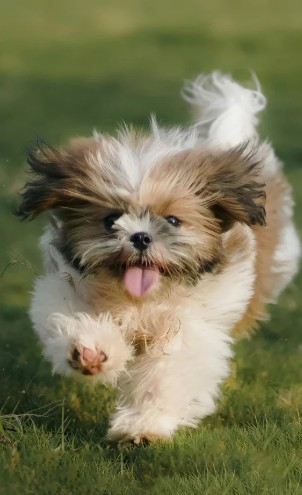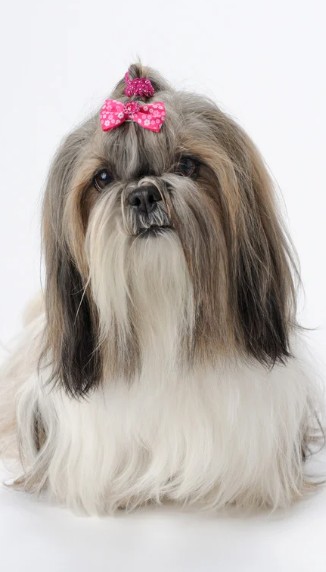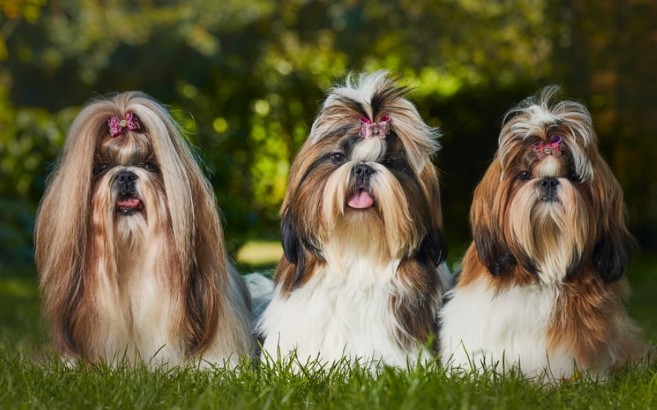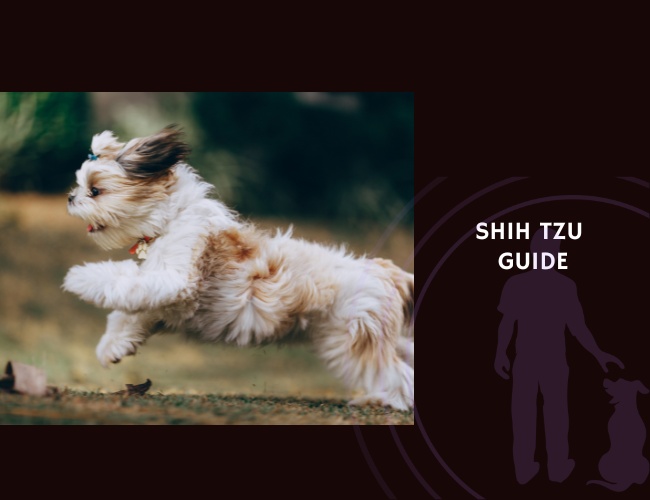The Shih Tzu, whose name translates to “lion dog” in Mandarin, carries within its small frame centuries of imperial Chinese history and selective breeding for companionship. This ancient breed, once treasured by Chinese royalty and hidden behind palace walls, has evolved into one of the most beloved family companions worldwide. Let us guide you through understanding these remarkable dogs, from their distinctive personality traits to their specific care needs, helping you determine if this affectionate breed is the perfect match for your lifestyle.
Character & Behavior
Decoding Your Shih Tzu’s Personality
Your Shih Tzu’s affectionate nature isn’t just a charming trait—it’s deeply rooted in their neurobiological makeup and centuries of selective breeding for companionship. Understanding these behavioral patterns helps you build a more meaningful relationship with your furry friend.
Companion-Oriented Bonding and Emotional Expression
Did you know that when your Shih Tzu gazes into your eyes, both of you experience a surge of oxytocin—the same bonding hormone released between human parents and their babies? This companion-oriented bonding manifests in several ways:
- Shadow behavior: Your Shih Tzu follows you from room to room, maintaining visual contact
- Physical closeness: They seek lap time and prefer sleeping touching their humans
- Emotional mirroring: These sensitive dogs often reflect their owner’s emotional states
- Greeting rituals: Elaborate welcome displays involving whole-body wiggles and “happy sounds”
This intense bonding capacity means your Shih Tzu forms deep, lasting attachments. They’re not just pets living alongside you—they’re emotional companions who actively participate in your daily life, offering comfort during difficult times and celebrating your joys with enthusiastic tail wags and playful bounces.
Social Flexibility and Tolerance to Handling
The Shih Tzu’s social flexibility makes them exceptional therapy and comfort dogs. Their tolerance for handling stems from their palace dog heritage, where they were regularly groomed, carried, and adorned:
- Touch acceptance: Most Shih Tzus enjoy being held, petted, and groomed when properly socialized
- Stranger friendliness: They typically warm up to new people after initial assessment
- Adaptability to crowds: Unlike more anxious breeds, well-socialized Shih Tzus handle busy environments
- Patience with examination: Veterinary visits and grooming sessions are generally well-tolerated
However, individual variation exists. Some Shih Tzus may display touch sensitivity or handling preferences. Watch for appeasement signals like lip licking, yawning, or turning away—these indicate your dog needs a break from interaction.
Vocalization Patterns and Environmental Triggers
Your Shih Tzu’s vocalizations tell complex stories about their emotional state and environmental awareness. These dogs possess a surprisingly varied vocal repertoire:
- Alert barking: Sharp, repetitive barks signaling perceived intrusions or changes
- Attention-seeking whines: Soft, modulated sounds requesting interaction or resources
- Contentment grumbles: Low, rumbling sounds during petting or settling
- Play vocalizations: Higher-pitched barks and “talking” during excitement
Understanding these patterns helps you respond appropriately. A sudden increase in vocalization might indicate anxiety, boredom, or health issues. Conversely, a typically vocal Shih Tzu becoming quiet could signal illness or depression. Their vocalizations serve as an emotional barometer, helping attentive owners maintain their well-being.
Playfulness and Adaptability in Indoor Environments
Despite their royal heritage, Shih Tzus maintain a delightfully playful spirit throughout their lives. This playfulness, combined with their size, makes them perfect indoor companions:
- Burst play patterns: Short, energetic play sessions followed by rest periods
- Toy preferences: Soft toys for carrying, interactive puzzles for mental stimulation
- Indoor games: Hide-and-seek, gentle tug-of-war, and “find the treat” activities
- Social play: Gentle wrestling and chase games with trusted companions
Their adaptability shines in how they modify play behavior for different environments. A Shih Tzu learns to play quietly in apartments, reserving more boisterous activities for appropriate spaces. This behavioral flexibility demonstrates their intelligence and desire to maintain harmony within their home environment.
Coping Mechanisms for Isolation or Change
Like many companion breeds, Shih Tzus can experience stress when facing isolation or environmental changes. Understanding their coping mechanisms helps you support them through transitions:
- Self-soothing behaviors: Favorite toy carrying, specific resting spots, routine adherence
- Stress indicators: Excessive grooming, appetite changes, vocalization increases
- Comfort-seeking: Increased clinginess or withdrawal, depending on individual temperament
- Adaptation timeline: Most Shih Tzus adjust to changes within 2-3 weeks with support
Creating predictable routines and maintaining familiar objects during transitions helps your Shih Tzu cope. Their resilience improves with positive experiences and patient support. Remember, their strong attachment means they rely on you for emotional stability during uncertain times 🧡

Training & Education
Unlocking Your Shih Tzu’s Learning Potential
Training a Shih Tzu requires understanding their unique cognitive profile and motivational drivers. These intelligent dogs possess distinct learning characteristics that, when properly channeled, lead to remarkable training success.
Cognitive Traits and Problem-Solving Capacity
Your Shih Tzu’s intelligence manifests differently from working breeds—they’re emotionally intelligent problem-solvers who excel at reading human cues:
- Social learning: They quickly learn household routines and human preferences
- Pattern recognition: Excellent at identifying daily patterns and anticipating events
- Selective focus: May prioritize social rewards over task completion
- Creative problem-solving: Finding novel ways to achieve desired outcomes
This cognitive style means traditional obedience training might need modification. Shih Tzus respond better to training that incorporates social interaction and emotional engagement rather than repetitive drills. They’re thinking dogs who appreciate variety and mental challenges presented in engaging ways.
Reward Preferences and Reinforcement Responsiveness
Understanding your Shih Tzu’s reward hierarchy dramatically improves training effectiveness:
Primary motivators:
- Social rewards: Praise, petting, play interaction with you
- Food rewards: Small, soft, aromatic treats work best
- Toy rewards: Brief play sessions with favorite toys
- Environmental rewards: Access to preferred locations or activities
Most Shih Tzus show strong responsiveness to combined reward systems. Pairing verbal praise with food treats creates powerful positive associations. Their food motivation typically remains consistent throughout life, making treat-based training effective even with senior dogs. However, portion control remains essential given their susceptibility to weight gain.
Potty Training and Small-Breed Challenges
Potty training represents one of the most common challenges Shih Tzu owners face. Their small bladder capacity and low body position create unique considerations:
- Frequency needs: Young puppies need opportunities every 1-2 hours
- Weather sensitivity: Cold or wet conditions may discourage outdoor elimination
- Substrate preferences: Many develop strong preferences for specific surfaces
- Indoor options: Paper training or litter boxes can supplement outdoor training
Success comes through consistency and patience. Create clear pathways to elimination areas, maintain regular schedules, and celebrate successes enthusiastically. Many Shih Tzus benefit from bell training—teaching them to ring a bell when they need outside access. This empowers them to communicate their needs clearly.
Cue Retention and Handler Specificity
Shih Tzus often display strong handler specificity in their training responses:
- Primary handler bonding: Strongest responses typically occur with primary caregiver
- Generalization challenges: May need practice responding to multiple family members
- Context dependency: Behaviors learned in one location may need re-teaching elsewhere
- Long-term retention: Excellent memory for consistently reinforced behaviors
Building generalization into training from the start helps. Practice commands with different family members in various locations. This prevents your Shih Tzu from becoming a “one-person dog” in terms of obedience and ensures reliable responses regardless of handler or environment.
Sensitivity to Voice Tone and Affective Cues
Your Shih Tzu’s emotional sensitivity makes them exceptionally responsive to voice modulation and body language:
- Positive tones: Happy, upbeat voices increase engagement and learning
- Harsh corrections: Can cause shutdown or anxiety responses
- Emotional contagion: Your stress or frustration directly impacts their performance
- Non-verbal communication: Often respond better to hand signals than verbal cues alone
This sensitivity requires trainers to maintain emotional regulation during sessions. If you’re frustrated, take a break—your Shih Tzu will detect and mirror your emotional state. Their desire to please combined with emotional awareness makes positive reinforcement methods particularly effective. Celebrate small victories enthusiastically; your joy becomes their motivation 🐾
Nutritional Recommendations
Fueling Your Shih Tzu’s Health
Proper Shih Tzu nutrition forms the foundation of your Shih Tzu’s health, affecting everything from their luxurious coat to their energy levels and longevity. Understanding their specific nutritional needs helps you make informed decisions about their diet.
Caloric Needs Based on Size and Activity Level
Shih Tzus require carefully calculated caloric intake to maintain optimal body condition:
Daily caloric guidelines:
- Puppies (2-12 months): 40-55 calories per pound of body weight
- Active adults: 30-35 calories per pound of body weight
- Less active adults: 25-30 calories per pound of body weight
- Seniors (7+ years): 20-25 calories per pound of body weight
These requirements vary based on individual metabolism, activity level, and health status. A typical 12-pound adult Shih Tzu needs approximately 360-420 calories daily. Monitor body condition regularly—you should feel but not see their ribs, and they should have a visible waist when viewed from above.
Coat Health and Nutrient-Dependent Maintenance
That glorious Shih Tzu coat requires specific nutritional support to maintain its health and luster:
Essential nutrients for coat health:
- Omega-3 fatty acids: Support skin health and reduce inflammation
- Omega-6 fatty acids: Maintain skin barrier function and coat shine
- Biotin: Promotes healthy hair growth and prevents brittle coat
- Zinc: Essential for skin healing and coat pigmentation
- High-quality proteins: Provide amino acids for keratin production
Look for foods containing fish oil, flaxseed, or other omega-rich ingredients. Many Shih Tzus benefit from supplementation, particularly those with dry or dull coats. However, balance is crucial—excessive supplementation can cause imbalances. Work with your veterinarian to determine if your Shih Tzu needs additional nutritional support.
Digestive Sensitivities and Food Tolerance
Shih Tzus frequently experience digestive sensitivities requiring dietary management:
Common sensitivities include:
- Protein sources: Some react to chicken, beef, or dairy proteins
- Grain sensitivities: While true allergies are rare, some benefit from grain-free diets
- Fat intolerance: Excessive fat can trigger pancreatitis in susceptible dogs
- Artificial additives: Colors, flavors, and preservatives may cause reactions
Signs of food sensitivities include chronic ear infections, excessive paw licking, digestive upset, or skin issues. An elimination diet under veterinary guidance can identify triggers. Many Shih Tzus thrive on limited-ingredient diets featuring novel proteins like duck, venison, or fish.
Graceful. Grounded. Devoted.
This is not a lapdog. This is legacy wrapped in fur. Beneath the flowing coat and gentle eyes lies the echo of emperors, the memory of palace walls, and the soul of a dog bred not to serve—but to stay. By your side. Always.
The Shih Tzu doesn’t work. It watches. It doesn’t chase—it waits. And in that stillness, something rare happens: presence. This is a dog who learns your rhythms, syncs with your emotions, and turns ordinary afternoons into rituals of connection. You don’t command a Shih Tzu—you invite.



Their affection is not flashy—it’s constant. Quiet. Undeniable. You’ll feel it when they rest their head on your foot. You’ll see it in their eyes, blinking slowly as if to say, “We’re okay. Right now. Just like this.” And in a world addicted to motion, that kind of loyalty is a revolution.
Dental Health and Nutritional Prevention of Tartar Buildup
Dental disease poses significant risks for Shih Tzus, making nutritional prevention strategies essential:
- Kibble texture: Appropriately sized dry food can provide mechanical cleaning
- Dental diets: Specially formulated foods with larger kibble or specific textures
- Raw bones: Under supervision, raw bones provide natural teeth cleaning
- Dental chews: Enzymatic chews help reduce plaque and tartar buildup
Avoid sugary treats and table scraps that promote bacterial growth. Some Shih Tzus benefit from water additives that reduce oral bacteria. Remember, nutritional strategies supplement but don’t replace regular dental care and professional cleanings.
Supplemental Needs in Aging or Brachycephalic Breeds
As your Shih Tzu ages or if they show pronounced brachycephalic features, supplementation becomes increasingly important:
Beneficial supplements include:
- Glucosamine/chondroitin: Support joint health and mobility
- Probiotics: Maintain digestive health and immune function
- Antioxidants: Combat age-related cellular damage
- L-carnitine: Support heart health and energy metabolism
- Eye supplements: Lutein and zeaxanthin for ocular health
Always introduce supplements gradually and under veterinary guidance. Quality matters—choose supplements specifically formulated for dogs from reputable manufacturers. Monitor for any adverse reactions and adjust as needed based on your Shih Tzu’s response.
Diseases & Susceptibilities
Protecting Your Shih Tzu’s Health
Understanding breed-specific health concerns empowers you to provide preventive care and early intervention when needed. Shih Tzus, while generally healthy, have certain predispositions requiring vigilant monitoring.
Brachycephalic Obstructive Airway Syndrome (BOAS)
BOAS represents one of the most significant health concerns for Shih Tzus. This condition results from their shortened facial structure:
Key BOAS indicators:
- Noisy breathing: Snoring, snorting, or wheezing sounds
- Exercise intolerance: Rapid fatigue or breathing distress during activity
- Heat sensitivity: Difficulty regulating temperature in warm conditions
- Sleep disruption: Frequent position changes or elevated sleeping positions
Managing BOAS requires lifestyle modifications. Maintain healthy weight to reduce respiratory effort, avoid overheating, use harnesses instead of collars, and limit strenuous exercise during hot weather. Some dogs benefit from surgical intervention to improve airway function. Regular monitoring helps you recognize when veterinary intervention becomes necessary.
Ocular Disorders and Eye Injury Risk
Your Shih Tzu’s prominent eyes, while endearing, create vulnerability to various ocular conditions:
Common eye issues include:
- Corneal ulcers: Scratches or injuries to the eye surface
- Dry eye (KCS): Insufficient tear production causing discomfort
- Progressive retinal atrophy: Genetic condition causing vision loss
- Cataracts: Lens clouding affecting vision clarity
Daily eye examination becomes part of your routine. Look for discharge, cloudiness, redness, or squinting. Keep facial hair trimmed away from eyes, use protective eyewear during grooming, and avoid situations where eye injury might occur. Early detection and treatment preserve vision and comfort.
Dental Disease and Oral Structural Crowding
Dental disease affects most Shih Tzus by age three, making oral health a primary concern:
- Crowded teeth: Create food traps promoting bacterial growth
- Retained baby teeth: Common in small breeds, requiring extraction
- Periodontal disease: Leads to tooth loss and systemic health issues
- Oral tumors: More common in dogs with chronic dental disease
Establish dental care routines early. Daily brushing ideal, but even 3-4 times weekly significantly reduces disease risk. Professional cleanings under anesthesia allow thorough evaluation and treatment. Some Shih Tzus require tooth extractions to resolve crowding issues and improve overall oral health.

Intervertebral Disc Disease (IVDD) and Spinal Health
IVDD can affect Shih Tzus, particularly those with longer backs relative to leg length:
Prevention strategies:
- Weight management: Excess weight increases spinal stress
- Controlled jumping: Use ramps or steps for furniture access
- Proper lifting: Support both chest and hindquarters when carrying
- Core strengthening: Gentle exercises maintain spinal support muscles
Watch for signs like reluctance to move, hunched posture, or vocalization when touched. Early intervention improves outcomes. Some Shih Tzus benefit from preventive measures like acupuncture or physical therapy to maintain spinal health throughout life.
Hypothyroidism and Metabolic Regulation
Hypothyroidism commonly develops in middle-aged Shih Tzus, affecting metabolism and overall health:
Clinical signs include:
- Weight gain: Despite normal or reduced food intake
- Lethargy: Decreased interest in activities
- Coat changes: Dullness, excessive shedding, or hair loss
- Behavioral changes: Increased anxiety or mental dullness
Annual thyroid screening after age four helps detect early changes. Treatment involves daily thyroid hormone supplementation, with excellent prognosis when properly managed. Regular monitoring ensures appropriate dosing as needs change over time 🧡
Attitude & Lifestyle: Creating the Perfect Environment
Your Shih Tzu’s lifestyle needs reflect their breeding as companion dogs. Understanding these requirements helps you create an environment where they truly thrive.
Urban Adaptability and Space Efficiency
Shih Tzus excel in urban environments, making them perfect apartment companions:
- Minimal space requirements: Happy in studios to mansions with proper attention
- Noise considerations: Generally quiet neighbors with training
- Elevator comfort: Usually adapt well to vertical living
- Indoor exercise: Can meet activity needs through indoor play
Their adaptability doesn’t mean they’re sedentary. Create enriching indoor environments with puzzle toys, climbing structures, and designated play areas. Regular outdoor excursions for mental stimulation remain important, even if physical exercise happens primarily indoors.
Grooming Tolerance and Coat Maintenance Behavior
That beautiful coat requires commitment, but most Shih Tzus learn to enjoy grooming when properly introduced:
Daily maintenance includes:
- Face cleaning: Prevent tear staining and food debris
- Brushing: Prevent matting and distribute natural oils
- Topknot maintenance: Keep hair from irritating eyes
- Paw checks: Remove debris and check nail length
Many owners opt for “puppy cuts” to reduce maintenance while maintaining breed appearance. Professional grooming every 4-6 weeks keeps coats manageable. Start grooming routines early, making sessions positive experiences with treats and praise. Well-trained Shih Tzus often find grooming relaxing and bonding.
Social Compatibility with Children and Other Pets
Shih Tzus generally display excellent social compatibility when properly socialized:
With children:
- Gentle nature: Rarely aggressive but need protection from rough handling
- Size considerations: Vulnerable to injury from young children
- Teaching moments: Excellent for teaching gentle pet interaction
- Mutual benefits: Provide comfort and companionship to respectful children
With other pets:
- Dog-friendly: Usually enjoy canine companionship
- Cat-tolerant: Often coexist peacefully with felines
- Small pet caution: May chase rodents or birds
- Pack dynamics: Prefer being followers rather than leaders
Successful multi-pet households require proper introductions and ongoing supervision. Shih Tzus typically adapt well to existing pets and welcome new additions when introduced gradually.
Exercise Needs and Energy Regulation
While not athletic dogs, Shih Tzus require regular activity for physical and mental health:
Daily exercise recommendations:
- Puppies: Multiple short play sessions totaling 20-30 minutes
- Adults: Two 15-20 minute walks plus playtime
- Seniors: Gentle activity adjusted to mobility levels
- Mental exercise: Puzzle toys and training sessions
Their exercise needs fluctuate with weather—they may resist outdoor activity in extreme temperatures. Indoor alternatives like hide-and-seek, fetch in hallways, or interactive toys maintain fitness. Swimming provides excellent low-impact exercise for dogs who enjoy water.
Aging, Sensory Decline, and Care Transitions
Senior Shih Tzus require thoughtful adaptations to maintain quality of life:
Age-related changes include:
- Vision decline: Navigate familiar spaces well but struggle with changes
- Hearing loss: May not respond to verbal cues
- Mobility issues: Arthritis or muscle weakness affecting movement
- Cognitive changes: Confusion, anxiety, or altered sleep patterns
Create senior-friendly environments with non-slip surfaces, accessible resources, and consistent routines. Many benefit from orthopedic bedding, raised food bowls, and gentle massage. Maintain social interaction and mental stimulation appropriate to their capabilities. Their companion nature means they particularly value continued inclusion in family activities, even if participation looks different 🐾
Senior Care: Cherishing the Golden Years
As your Shih Tzu enters their senior years (typically around age 7-8), their care needs evolve while their loving nature remains constant. Understanding these changes helps you provide optimal support during this precious life stage.
Physical Adaptations for Comfort
Senior Shih Tzus benefit from environmental modifications that support aging bodies:
- Orthopedic support: Memory foam beds reduce joint pressure
- Temperature regulation: Extra bedding for warmth, cooling mats for summer
- Accessibility aids: Ramps to favorite furniture, raised feeding stations
- Vision accommodations: Night lights, consistent furniture placement
These adaptations prevent injury while maintaining independence. Many seniors develop preferences for specific sleeping arrangements or require more frequent position changes. Observing and responding to these preferences enhances comfort significantly.
Nutritional Adjustments for Senior Health
Aging Shih Tzus often require dietary modifications:
- Reduced calories: Lower metabolism requires portion adjustment
- Enhanced nutrients: Higher quality proteins, added antioxidants
- Digestive support: Easily digestible formulations, smaller meals
- Hydration focus: Wet food or broths to increase water intake
Some seniors develop pickier appetites or dental issues affecting eating. Warming food slightly, adding low-sodium broth, or transitioning to softer textures maintains nutritional intake. Regular weight monitoring helps you adjust portions appropriately.
Mental Stimulation and Cognitive Health
Keeping senior minds active delays cognitive decline:
- Gentle training: Continue learning new tricks at their pace
- Puzzle feeders: Maintain problem-solving skills during meals
- Social interaction: Regular but calm social experiences
- Routine enrichment: New scents, textures, or safe exploration
Many senior Shih Tzus experience “sundowning”—increased confusion during evening hours. Maintaining consistent routines and providing comforting presence during these times reduces anxiety. Some benefit from cognitive support supplements under veterinary guidance.
Conclusion: Is the Shih Tzu Right for You?
After exploring the multifaceted nature of Shih Tzu ownership, you’re better equipped to determine if this remarkable breed aligns with your lifestyle. These dogs offer unparalleled companionship, bringing centuries of breeding for human bonding into modern homes.
The Shih Tzu might be your perfect match if you:
- Desire a deeply affectionate, emotionally intelligent companion
- Can commit to regular grooming or professional maintenance
- Live in any size home but want an adaptable indoor dog
- Appreciate a playful yet calm temperament
- Want a dog that bonds strongly with all family members
- Can provide consistent, positive-based training
- Understand and can manage brachycephalic health considerations
Consider other breeds if you:
- Prefer minimal grooming requirements
- Want a highly athletic or working dog
- Cannot tolerate any barking or vocalization
- Have very young children who might accidentally injure a small dog
- Travel frequently without ability to include your pet
- Prefer more independent, aloof personalities
The Shih Tzu’s enduring popularity stems from their remarkable ability to adapt to diverse lifestyles while maintaining their core essence as devoted companions. Whether residing in bustling cities or quiet suburbs, with singles or large families, these versatile dogs bring joy, comfort, and unwavering loyalty to those fortunate enough to share their lives.
Their health considerations, while requiring attention, are manageable with proper care and preventive measures. The grooming commitment, often seen as challenging, becomes a bonding ritual many owners treasure. Most importantly, the emotional rewards of Shih Tzu companionship—their intuitive understanding, comic antics, and steadfast devotion—far outweigh any challenges.
As you make your decision, remember that welcoming a Shih Tzu means gaining not just a pet, but a dedicated friend who will share your daily life with enthusiasm and affection. Their legacy as imperial companions continues in every gentle tail wag, every contented sigh as they curl up beside you, and every joyful greeting that says, “You’re my whole world.”
The journey with a Shih Tzu is one of mutual devotion, filled with grooming sessions that become meditation, walks that become adventures, and quiet moments that become treasured memories. If you’re ready for this level of companionship, your Shih Tzu is waiting to begin writing your shared story together 🧡










